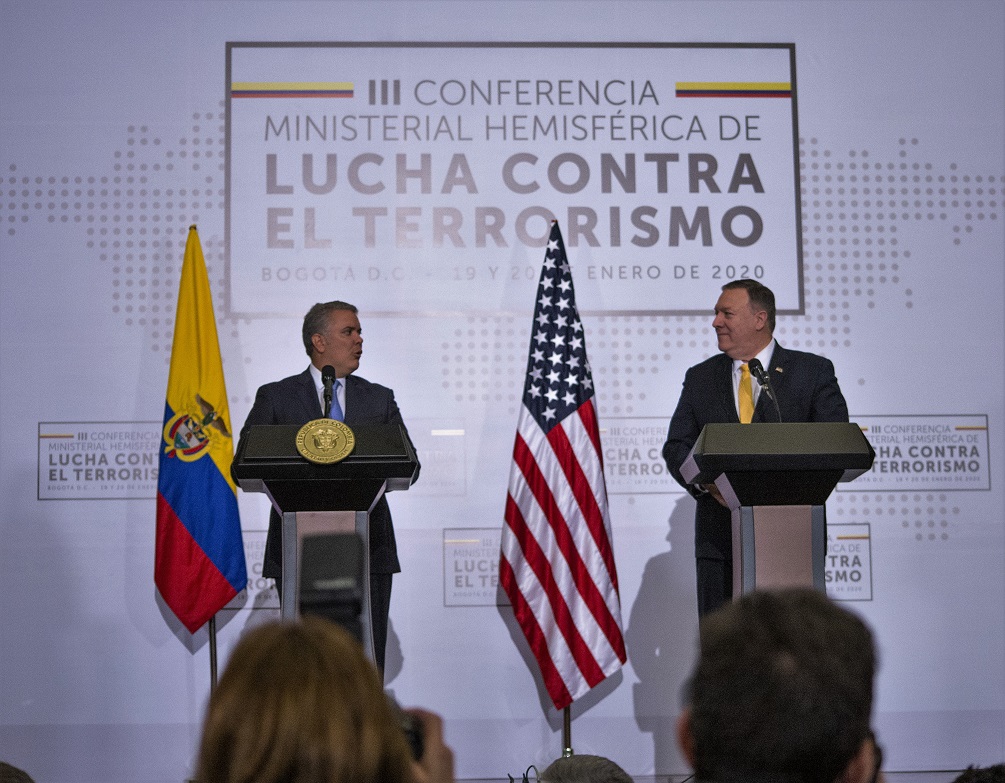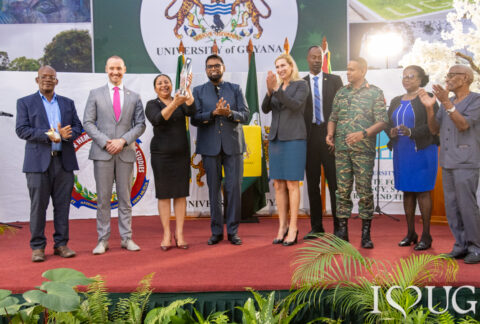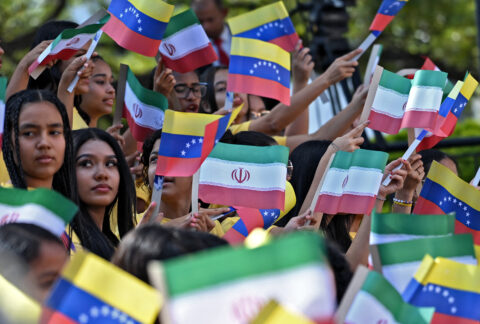U.S. Secretary of State Mike Pompeo characterized as “unacceptable” the presence in Venezuela of the Lebanese Shiite movement Hezbollah, considered a terrorist group and Iran’s proxy,
The head of U.S. diplomacy made the statement January 20 at the Third Western Hemisphere Counterterrorism Ministerial Summit, which brought together ministers from more than 20 countries of the region, in Bogotá, Colombia.
“The Iranian regime’s top terrorist proxy, Hezbollah, has found a home in Venezuela under [Nicolás] Maduro. This is unacceptable,” said Pompeo, at a time of heightened tensions between Washington and Tehran’s Islamic regime.
Colombian President Iván Duque confirmed the presence of the Lebanese group in Venezuela and said that this has been public knowledge for the past few years.
“We’ve seen the presence of Hezbollah cells in countries like Venezuela, with the consent and connivance of the Nicolás Maduro dictatorship,” said Duque, adding that terrorism has affected Latin America and that the actions of different international criminal organizations have been noted.
In contrast with Venezuela, Pompeo praised the position of Colombia and other South American nations that joined the United States and the European Union in classifying Hezbollah, and other groups, as “terrorists”.
Duque stated his position toward Hezbollah at the summit’s opening session, in which Venezuela’s Interim President Juan Guaidó took part.
The Colombian leader said that on January 17, the Colombian Security Council unanimously approved the adoption of the United States and the European Union’s lists of terrorist organizations and people “to focus the efforts of government authorities against these threats.”
Duque invited the summit’s participating countries to “adopt all resolutions issued by the United Nations Security Council.”
He referred to United Nations Security Council Resolution 1373, which, he said, “is very clear and strong in that no State can be allowed to promote, shelter, sponsor, or facilitate terrorist activities in its territory.”
He added that countries that violate the resolution and engage in practices that favor terrorist organizations “deserve to be sanctioned, denounced, and deserve this reaction to be collegial through all possible multilateral forums.”
According to the Colombian Security Council’s minutes, “terrorist groups such as the National Liberation Army [ELN, in Spanish], Shining Path, and Hezbollah are present in Colombia and Latin America, and constitute a threat to international peace and security.”
The Colombian leader’s declaration came after other South American countries adopted a similar posture against Hezbollah. Argentina, Brazil, Honduras, Paraguay, and Peru declared Hezbollah a terrorist organization. Guatemala, according to Pompeo, will soon follow.
Pompeo praised countries like Argentina and Brazil, which froze assets of Hezbollah members and arrested some of its leaders.
During the Western Hemisphere Counterterrorism Ministerial Summit, ministers and leaders of participating countries discussed several strategies against the threats the American continent faces.
Duque, joined by regional leaders, inaugurated the summit at the Francisco de Paula Santander Police Academy, which was the target of a terrorist attack that took more than 20 lives in January 2019.
Guaidó’s surprise arrival in Bogotá to participate in the summit marked the beginning of a tour that will take him to the United States and European countries. This is the second time he defies an order, imposed by the illegitimate Maduro regime, forbidding him to leave the country.
Final joint statement
The final joint statement reflected much of what was addressed during the summit and rejected terrorism in all its forms. It also expressed concern over terrorist groups such as the Islamic State group and al-Qaida, and the activities that Hezbollah cells continue to carry out in some areas of the Western Hemisphere, as well as ELN operations.
The joint statement mentions Venezuela as an example of a country whose institutional weakness or internal conflict allows criminal organizations “to promote terrorist acts and criminal activities in the region.”
The signatory countries highlighted the need to promote and implement hemispheric initiatives to fight terrorism and reaffirmed their commitment to strengthen their efforts to combat the sources of terrorist funding.
Leaders also vowed to keep strengthening their national legal frameworks to implement financial sanctions and other measures “to freeze the assets linked to terrorist organizations.”









